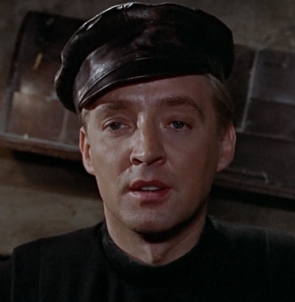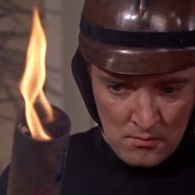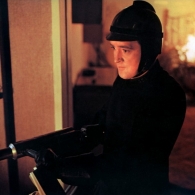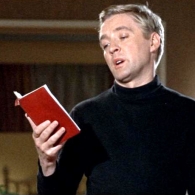
A thirty-year-old fireman, Guy is satisfied with his job which involves burning books and houses where they are illegally kept. For many years he has been an illustration of rationality, professionalism, and ignorance. Yet, he is experiencing a growing discontent which ends in a personal crisis. Guy suddenly realizes that his existence is deprived of meaning and is, in fact, hollow and empty. Meeting with Clarisse McClellan is a wake-up call that reveals the upsetting truth about his loveless relationships with his wife, Mildred. Guy begins to steal and read books hoping to find the solution to his problems. This brings him to Professor Faber who becomes his mentor and guides him on a path of self-discovery. Despite feeling guilty for breaking the law and reading books, Guy finally realizes the ugliness of the world he lives in.
Guy Montag Photo Gallery
Guy Montag Quotes
Nobody listens any more. I can’t talk to the walls because they’re yelling at me. I can’t talk to my wife; she listens to the walls. I just want someone to hear what I have to say. And maybe if I talk long enough, it’ll make sense. And I want you to teach me to understand what I read.
It took some man a lifetime maybe to put some of his thoughts down, looking around at the world and life, and then I came along in two minutes and boom! it’s all over.
If you don’t want a house built, hide the nails and wood. If you don’t want a man unhappy politically, don’t give him two sides to a question to worry him; give him one. Better yet, give him none.
Last night I thought about all the kerosene I’ve used in the past ten years. And I thought about books. And for the first time I realized that a man was behind each one of the books. A man had to think them up. A man had to take a long time to put them down on paper. And I’d never even thought that thought before.
There must be something in books, things we can’t imagine, to make a woman stay in a burning house; there must be something there. You don’t stay for nothing.
I’ve heard rumours; the world is starving, but we’re well-fed. Is it true, the world works hard and we play? Is that why we’re hated so much? I’ve heard the rumours about hate, too, once in a long while, over the years. Do you know why? I don’t, that’s sure! Maybe the books can get us half out of the cave. They just might stop us from making the same damn insane mistakes!
Off-hours, yes. But time to think? If you’re not driving a hundred miles an hour, at a clip where you can’t think of anything else but the danger, then you’re playing some game or sitting in some room where you can’t argue with the four wall televisor. Why? The televisor is ‘real.’ It is immediate, it has dimension. It tells you what to think and blasts it in. It must be, right. It seems so right. It rushes you on so quickly to its own conclusions your mind hasn’t time to protest, ‘What nonsense!’
When I was a boy my grandfather died, and he was a sculptor. He was also a very kind man who had a lot of love to give the world, and he helped clean up the slum in our town; and he made toys for us and he did a million things in his lifetime; he was always busy with his hands. And when he died, I suddenly realized I wasn’t crying for him at all, but for the things he did. I cried because he would never do them again, he would never carve another piece of wood or help us raise doves and pigeons in the back yard or play the violin the way he did, or tell us the jokes the way he did. He was part of us and when he died, all the actions stopped dead and there was no one to do them just the way he did. He was individual. He was an important man. I’ve never gotten over his death. Often I think, what wonderful carvings never came to birth because he died. How many jokes are missing from the world, and how many homing pigeons untouched by his hands. He shaped the world. He did things to the world. The world was bankrupted of ten million fine actions the night he passed on.
Impossible; for how many people did you know that refracted your own light to you?
Guy Montag in the Essays
Symbolism in Fahrenheit 451
Thesis Statement Ray Bradbury in Fahrenheit 451 uses forceful figurative language and imagery through suggestive symbols which depict and cover the main themes of the novel. Introduction In Ray Bradbury’s Fahrenheit 451, Montag’s escape through the river symbolizes his salvation, along…
Compare Brave New World and Fahrenheit 451 on utopias
Brave New World and Fahrenheit 451 are two novels, both set in the future, which have numerous similarities throughout them. Of all their common factors, those that stand out most would have to be: first, the outlawed reading of books; second, the superficial preservation of beauty and happiness…
Guy Montag in Fahrenheit 451, and his duality.
Guy Montag, the main character in Fahrenheit 451, goes through a huge change. He starts out to be a fireman; someone who burns banned books (a book that is illegal to have or read because it is thought to be ‘inappropriate’ by some group or organization, or the like). In the book, you were…
“Fahrenheit 451” and Guy Montag.
Essay about Guy Montag Throughout the book Fahrenheit 451, Guy Montag changes from a relatively ‘typical’ fireman who follows the laws of his society into a person who challenges the laws and eventually becomes an ‘outcast’. In the book Clarisse McClellan, the 17-years old girl…
Three Important Scenes in Fahrenheit 451
Three Important Scenes In The Hearth and the Salamander, the first in the trilogy of sections in Fahrenheit 451, Guy Montag goes through a period of curiosity and discovery. This is when he takes a book from a house he is burning, unbeknown to the other workers. For the next day or two, he…
fahrenheit 451 brave new word
Fahrenheit 451 Brave New World Fahrenheit 451, by Ray Bradbury is a futuristic view of a society and its people’s roles. This prophetic novel, first written and published in the early 1950s, is set in a future where books, and the ideas they represent and manifest, are burned to prevent…
The theme of duality in “Fahrenheit 451”
The book “Fahrenheit 451” by Ray Bradbury is an extremely powerful novel. It speaks volumes about the nature of human society, and how it behaves under the circumstances of a bleak dystopia. In achieving this, Bradbury pushes the theme of duality via the specific instances of Montag…
How Bradbury in Fahrenheit 451 uses technique to challenge the ideologies at the time that the novel was written
In the novel ‘Fahrenheit 451’, Bradbury issues a warning to future generation by challenging the ideologies of his time. The ideologies of censorship and knowledge vs. ignorance in the novel are reflected at the height of strong anticommunism in 1950s – when McCarthy almost…
Fahrenheit 451 Guy Montag Analysis
Guy Montag is a firefighter who lives in a futuristic society where the government completely controls every aspect of life. There’s just one thing that the government is still trying to control and that is books. Guy’s job as a firefighter is too find books and set them on fire, till…
Anthem and Fahrenheit 451 comparative essay
? In both Anthem and Fahrenheit 451 the society the characters live in is government controlled and they limit certain things in the lives of the citizens. Both of the authors of these books are trying to warn today’s societies about the dangers of the different faults they each exhibit and how…
Anthem and Fahrenheit 451 comparative essay
? In both Anthem and Fahrenheit 451 the society the characters live in is government controlled and they limit certain things in the lives of the citizens. Both of the authors of these books are trying to warn today’s societies about the dangers of the different faults they each exhibit and how…

Author: Arron Johnston




Leave a Reply